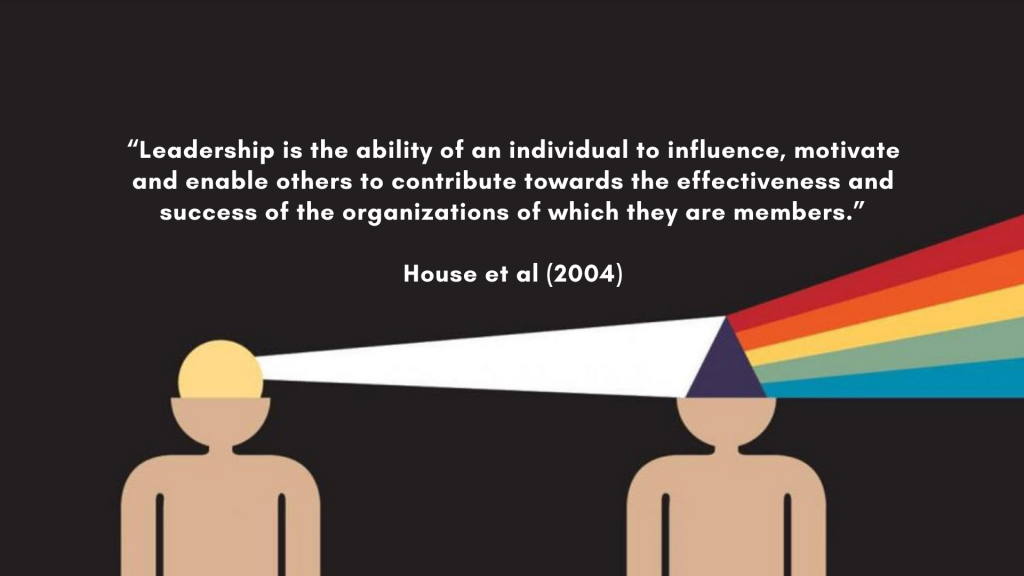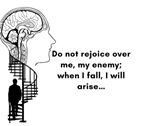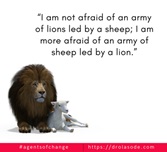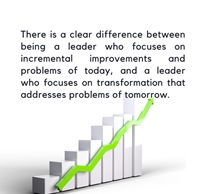In my many years of study, research and teaching, I have never found a consistent definition of leadership. Perhaps, this is because leadership is less about an act and more about the delivery of the act. Hence, some would view leadership as an art, rather than a science; an art that includes ‘influencing and directing people in such a way that will win their obedience, confidence, respect and loyal cooperation in achieving common objectives.’
Leadership is more about what you do than who you are.
One would doubt if it was Jeanne d’Arc’s desire to be burnt alive at the stake by the English at the age of 19 in 1431. Neither would it have been a desire of Dr Martin Luther King Jr to be shot dead at the age of 39 in 1968. Both of them, however, won the respect, loyalty and confidence of people across generations and will remain influential figures and instruments of great change for generations to come.
It has been suggested that there are as many definitions of leadership as there are people trying to define leadership. I have read hundreds or close to thousands of definitions or variants out there. Kort (2008) suggested that the concept of leadership seems to be a fluid one and cannot be captured in a definition. However, without a simplified way to capture the concept of leadership, how would one know if their capacity and actions lean towards becoming a great leader and an Agent of Change, or how can one establish the right steps to take in leadership? The attempt by House et al (2004) focuses on influence and motivation:
‘…to influence, motivate and enable others to contribute…’

The point being made here is that being a leader is not solely about the person in leadership, but more about the relationship between the leader and other people, and what the leader does to create change in the system and through people. Moses refused to be celebrated for his heroic confrontation with Pharaoh in the book of Genesis, and Joseph refused to be worshipped for being God’s instrument in providing sustenance for the people of Israel and the ancient world.
Great leaders do not put themselves ahead of their assignment or tasks. If you put yourself ahead of God’s work through you and make yourself the object of focus, then you have lost your call to lead. Sadly, we have many who call themselves leaders but are misusing the authority given to them by God, instead of them presenting themselves to be used as God’s agents of change. A leader’s focus should be on their calling, assignment, and how to navigate, motivate and influence people to deliver for the benefit of all.
How should a leader navigate? In maritime, to navigate is to plan and direct the course of a ship, aircraft, or other forms of transport, especially by using instruments or maps. This suggests that the leader must have a vision of where they are taking the ship (visioning was covered in the earlier chapters). One of the things I find most fascinating about navigation is the ability to re-route.
It does not matter how many mistakes you have made along the way, as long as you keep your eyes on the destination, you will always be able to re-route your way back to success.
Glenn Llopis, in his contribution to Forbes in 2012 suggested that leaders should not be
“afraid to course correct, make the difficult decisions and establish standards of performance…and improving at all times.”The ability to turn around from wrong directions, rise up from bad experiences and navigate yourself, your team and your followers towards the destination, is a key attribute of an agent of change. This requires a high degree of self-motivation, that is, knowing who you truly are and what you are destined to be. Just as the Prophet Micah once said,
“Do not rejoice over me, my enemy; when I fall, I will arise…” and the wise King Solomon, “For a righteous man may fall seven times and rise again”

To motivate, on the other hand, involves stimulating a natural desire or appetite in someone to want to do something. Many have oversimplified motivation to mean an incentive or a form of inducement.
In 1933, when Hitler took power in Germany, only a small minority of the ordinary people shared Nazi antisemitism which saw ‘the Jews’ being regarded as enemies of the people and a threat to Germany’s survival. However, a combination of fear, perceived opportunities and pressures made more and more people rationalise Hitler’s unthinkable actions. When the South African Presidency of Nelson Mandela began in 1994, the majority of the ‘black’ population wanted revenge for apartheid. However, he was able to change the course of history by motivating positive actions through positive morales, relationships and perceived benefits of communalism. In both cases, each leader provided reasons that made the people act or behave in their particular ways; albeit negative in one case, and positive in the other. Such motivational inspiration is a critical component of Agents of Change and great leaders.
An ice breaker I use in some of my leadership teachings involves a pride of lions attacking a herd of sheep. Under normal circumstances, a confrontation between an average lion and a sheep would end with the sheep becoming the lion’s dinner. This outcome will not change even if there were twenty lions in the pride against a herd of twenty sheep. However, the scenario changes when the herd of sheep is led by a lion, and the pride of lions is led by a sheep. In classroom discussions, I encourage participants to role-play being a lion in both situations; either as an Agent of Change leading the sheep (a weak institution), to overcome an unthinkable challenge or as an Agent of Change in a strong institution being led by a ‘sheepish’ leader.

The outcome is usually that the strong, lion-leader will motivate and inspire the sheep to think and act like lions, thereby overcoming the actual lions who may have been weakened by their sheep-leader.
Reflecting on these scenarios, Winston Churchill, or perhaps, Alexander the Great, was quoted to have said:
“I am not afraid of an army of lions led by a sheep; I am afraid of an army of sheep led by a lion.”The key here is a leader’s power of motivation – not to induce, but to inspire; not to force, but to encourage; and not to tempt, but to enthuse.
This leads us to the term, ‘influence’. House et al suggest that the ability to influence followers is a key component of leadership. For you to be an Agent of Change, you must exercise some form of influence and authority over the subject matter – people, process, programme or product. In their study on ‘power and influence in leadership’ (1959), social psychologists, John French and Bertram Raven demonstrated how leaders develop power bases, exercise influence and use legitimate authority in leadership. Perhaps, a good ‘lion’ leader uses its existence as a lion as legitimate authority to suggest that sheep could, notionally, become lions.

In the final few verses of Matthew’s gospel of Jesus Christ, the Bible recorded Jesus exerting His authority based on who He was, and encouraging His followers to do the same based on who they had become in Him:
The Apostle and Evangelist, Luke, extended this notion in his records of the last few words of Jesus about the power and authority of the Believer, recorded at the end of Luke’s gospel and the beginning of the Acts of the Apostle:
The power promised here is to enable us to exercise influence and become His witnesses as examples and evidence of God’s power and influence over everything and anything all over the world. Power, in English logical construct, relates to ability, capacity, authority, and might or strength. Translated in the Bible from the Greek words ‘exousia’ and ‘dunamis’, it means force or authority. In the ancient Greek world, power was portrayed as a major cosmic principle too significant to describe.
The biblical description of power relates primarily to God and people, as power is an inherent characteristic of God and a derived characteristic of God’s people, who receive and apply His power and authority.

Paul, in Romans 1:16, describes the Gospel as God’s power that brings salvation. Salvation, here, referring to every promise and gift of God through Him, both intrinsic and derived. Later in his letter, Paul describes power in the Christian life as an empowerment from God.
Apostle Peter, in his letter, also utilises the concept of power to depict the Christian life as an empowerment from God for ‘all that pertain to life and godliness’.
In a Bible study discussion, I asked members of the group to define power and to describe what it meant to them. A lady in her fifties suggested it was the “ability to become”, a five-year-old boy said, “strength to overcome”, and a man in his fifties said, “authority to do things”. Another ten-year-old boy later described how he needed such power to become the greatest football player in the world and earn a lot more money than the $111 million annual income attributed to Lionel Messi. Whilst the motivation of the latter was the earnings, there was the clear recognition of the need for God’s power and authority to become what he believed God had called him to be, even at such an early age.
Agents of Change use their God-given power and enablement to transform lives, communities, nations and the world at large, rather than simply maintaining what is already in place; a focus of transformational leadership. Invariably, an Agent of Change is a Transformational Leader. A leader who focuses on breaking patterns, continuous learning, optimism, inspiration and innovation.

In a leadership masterclass, I asked a group of leaders to estimate what proportion of their time they spend on handling current issues versus the time spent on future issues, innovating or planning towards the unknown. . For most of them, the answer was a ratio of 100:0, spending most or all of their time on current issues, with just a few confirming that they spend the odd hour or two every few months to deal with the ‘unknown unknowns’.
“Why worry about the future?”, one said, “after all, Jesus asked us “not to worry about tomorrow”.Well, there is a clear difference between worrying about tomorrow and positioning yourself to be a builder of tomorrow and an Agent of Change.

If Moses had been stuck in his past experience as a fugitive or his present experience as a shepherd, he would not have been able to return to confront Pharaoh as God’s warrior and Agent of Change.
This site uses Akismet to reduce spam. Learn how your comment data is processed.


2 Comments
Alii Akoshile
Wow, this is simply awesome??
I have visited the website and I must confess it’s in a class of its own…easy navigation, cool feel, great content and remarkable scholarship. Dr., you deserve three Gbosas for this superlative intellectual engagement. ??????
I will recommend your books to everyone on this platform because learning is our tradition as Great Akokites. To be sure, the literary works include Agents of Change, Why Visions fail, Risk Management and Governance, and Visions Transformation Toolkits, among others.
Hummm, one of the books will make you discover our TAGs…go find out??♂️??♂️??♂️
Adama Abel
Such a great piece. What stroke me most is the example of a Lion leading an army of sheep and vice versa. A leader leads by the influence He has on the follower because a follower follows what you do not who you are. In the story of Elijah and Elisha in the Bible, Elisha watched his master Elijah as He stroke the sea with his mantle and it parted the sea. When the mantle was transferred to him, He did has He saw his master did and got thesame result. Leadership can never be overemphasized because He all lead in our different circle of influence.